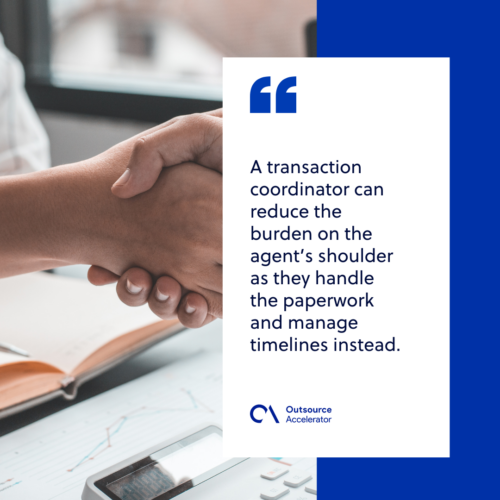What you need to know about a real estate transaction coordinator

Real estate agents have a lot on their plate. That is not a secret. They handle the customer service aspect, negotiate deals, and transact until they close the deal. However, it is much more than submitting offers and handing out the keys.
Making a home sale involves stacks of paperwork to review in a limited time window.
Real estate professionals can charm every seller and buyer. However, as the real estate deadline knocks on your door, having a transaction coordinator is an asset you cannot deny.
A transaction coordinator is widely familiar with the real estate industry.
As brokerage firms expand, the transaction documents increase and agents and brokers get busier. This is why real estate offices hire in-house or outsource transaction coordinators.
What does a transaction coordinator do?
A transaction coordinator plays a pivotal role in the real estate industry, ensuring that every aspect of a real estate transaction is managed efficiently.
Whether working in an office or remotely as a virtual transaction coordinator, the primary responsibility of a real estate transaction coordinator is to oversee the details of a real estate deal from start to finish.
By managing the paperwork, scheduling inspections, and coordinating communication between all parties, transaction coordinators help streamline the real estate transaction process, alleviating the administrative burden on the real estate agent.
A transaction coordinator keeps the deal together. They are responsible for overseeing the administrative matters of real estate transactions, including dealing with the paperwork, making phone calls, coordinating with the parties involved, and keeping records.
However, do not confuse a transaction coordinator with an administrative assistant.
You can delegate other compliance activities to a translation coordinator, like drafting a listing agreement and providing marketing support. Sometimes, they inspect the property area, analyze the expenses, and write finding reports.
These are a few examples of what they can do. When trained and managed well, they can do much more.
Having a transaction coordinator by your side allows you to perform higher-level tasks.

How a transaction coordinator helps your real estate business
While a real estate agent has the mastery of handling the overall process, one missed paperwork could ruin the chance of closing the deal. How does a transaction coordinator help the real estate industry?
The answer is simple: A transaction coordinator can help real estate businesses grow.
Real estate agents can feel overwhelmed and overworked because they try to manage several tasks simultaneously. A transaction coordinator can reduce the burden on the agent’s shoulder by handling the paperwork and managing timelines instead.
This help goes a long way, as real estate agents can concentrate on selling properties, negotiating deals, and cultivating relationships with clients. This increased efficiency leads to more sales and profit–a win for the real estate business.

6 important skills for a real estate transaction coordinator
Transaction coordinators may or may not need a license to perform administrative tasks. However, they should possess these six hard and soft skills to contribute significantly to the business growth of real estate businesses:
1. Quick learner
Businesses that want to maximize their resources should look for a certified transaction coordinator with experience working in the real estate industry.
However, if an experienced individual is not available or is too costly, a quick learner can also do wonders for the business. They should be able to work efficiently under minimal supervision.
2. Detail-oriented
Real estate agents are just some of the ones who have multiple tasks to complete at once; transaction coordinators juggle, too. As they multitask, they need to pay attention to minor details, which serve as the last barrier to avoiding missed deadlines.
When reviewing a document, being meticulous and thorough can reduce errors.

3. Strong communication skills
Since transaction coordinators need to talk to the parties involved, effective communication is a must skill. Listening is also part of communication skills.
They should be able to ask questions, clarify misunderstandings, and handle questions that arise.
4. Organized
When looking for an effective transaction coordinator, being organized should be one of the skills you must consider.
It is their duty to ensure the transaction runs smoothly and efficiently. Is the transaction coordinator keeping track of the deadlines? Are they using a checklist or workflow to ensure they complete their to-dos?
5. Excellent customer service skills
As mentioned, a transaction coordinator’s duties include updating everyone, including clients, about pending real estate transactions. Aside from updating, they also assist and support clients, handle complaints, and resolve problems.
Exceptional customer service and regular customer communication lead to repeat clients and loyalty.
6. Passionate and committed
Financial need is the number one motivation for most working individuals. However, transaction coordinators should embody passion and commitment to accomplish a great deal of work.
Since their duties and responsibilities are complex and monotonous, they must treat the job as enjoyable to perform well.
Even if getting them up to speed takes time, they will be dependable in the long run.
Grow your real estate business with a transaction coordinator!
Large real estate brokerage firms have a team of in-house transaction coordinators. Smaller agencies and independent real estate professionals outsource a transaction coordinator to handle the contracts and workloads.
It is time to set the foundation for your business growth. If you feel overwhelmed with the activities you must do for several real estate clients, you need help.
Working with transaction coordinators can help you focus on closing deals rather than draining your energy on administrative tasks.
The growing trend of virtual transaction coordinators has allowed real estate professionals to access expert support from anywhere. These remote professionals handle the same tasks as in-office coordinators, making them an invaluable asset to agents looking to maximize efficiency.
Whether working with a local or virtual transaction coordinator, having the right person overseeing the details can make a difference in closing a successful deal.







 Independent
Independent




